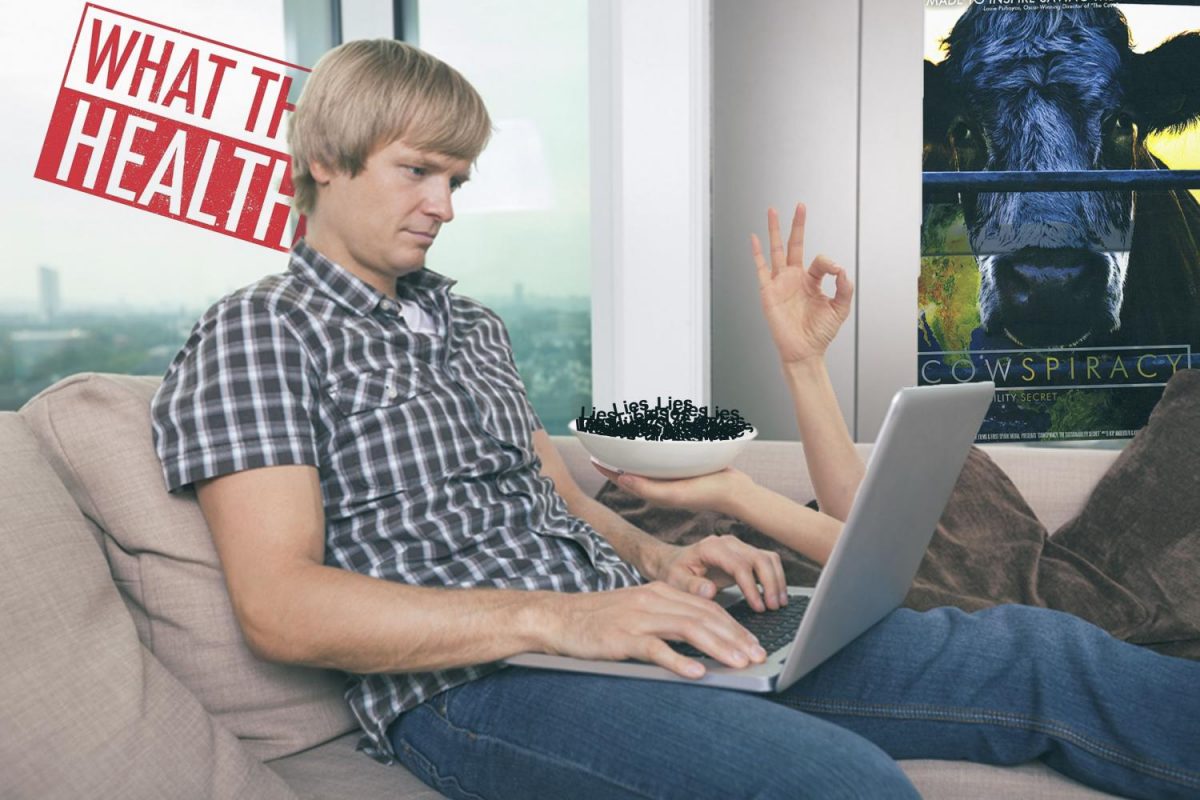Netflix food documentaries greatly influence student’s lifestyles
One of Netflix’s most defining categories is the documentary section. Nestled within thousands and thousands of hours of diverse film, lies two documentaries created by film director Kip Andersen.
“Cowspiracy” and “What the Health” are two fairly popular food documentaries that begin to explain the relationship between animal products and the United States government. Both films have been criticized heavily from major media sources such as The New York Times and Huffington Post. The documentaries admittingly stretch the truth regarding issues surrounding livestock’s contribution to global warming and diabetes.
However, despite the fact that the extreme statistics relayed in the film have been debunked, people, specifically students at Metea, have changed lifestyle choices due to these documentaries. Many of the aforementioned websites believe that the majority is still impacted by these documentaries regardless of whether or not they are truthful.
“I believe these documentaries are still impactful even though some of the facts have been proved to be incorrect. I still think it’s important to shed light on these topics” junior Clare Pajakowski said. Pajakowski made a significant change in her lifestyle after viewing the films, and she no longer eats meat. “I am a vegetarian because of ‘What the Health’. The film really emphasizes the process of making meat and after seeing that I don’t eat meat anymore.” Pajakowski added.
Remarkably, people still choose to follow facts that aren’t necessarily true. After the publication of Andersen’s first documentary, “Cowspiracy”, there was a website created for the film simply to fact check what was stated throughout the documentary.
Scientists and physicians all over the world have joined the global discussion talking about “Cowspiracy”. The film essentially blames meat eaters for contributing to global warming and encourages veganism over purchasing a Prius. In Andersen’s second documentary, “What the Health” the United States government is exposed for promoting companies that monopolize citizen’s health.
Despite the fact that major media outlets have disowned the films, despite the fact that scientists and physicians worldwide have questioned the facts, people still listen and trust Kip Andersen leading one to only repeatedly ask the question, “why?”
Obviously, these documentaries aren’t solely created to to be torn down by media, but if the facts reported aren’t true, what’s the point. Without these type of health films would the conversations still be occurring about the government’s involvement with the average american’s diet?
Junior Esha Mandadi watched “What the Health” and believes that these documentaries are still extremely impactful. “The amount of meat that Americans eat has increased to the point where a meal isn’t a meal if there’s no meat. Huge food corporations are advertising unhealthy products for the sake of getting more money. Americans are suffering while these companies are profiting.” Mandadi said.
If the reaction to the films doesn’t display the American human condition,it’s hard to know for sure what will. Americans, known worldwide for their terrible diets, are being called out in this documentary just to be shut down by the very thing that has come to define America, the media.
One can only wonder if the future will hold anything new for health within the United States. Hopefully, documentaries and fake facts, will help inspire Americans to pursue a passion for a better environment and to research what they are putting in their bodies.




Someone • Oct 10, 2017 at 7:43 pm
I plan to not watch these documentaries because I don’t want to spoil my appetite
Parker • Oct 3, 2017 at 3:09 pm
I watched this, and I am trying to cut back on how much meat I eat (as I am typing this while I eat a ham and cheese sandwich) but I don’t know how I’m going to completely stop eating it, I mean it’s going to be really hard for me because I love to eat meat.
Someone • Oct 10, 2017 at 7:40 pm
Just stop eating it, it’s just meat it not a big deal.
Maggie • Oct 2, 2017 at 9:01 am
This is such a great article. I watched the documentary as well and completely agree with all that was said about the film. Highly would recommend it changed my view on our food industry for the good and made me more aware with the things I put in my body.
clare • Oct 3, 2017 at 6:12 pm
I loved what you had to say about the government’s involvement with american diets. I think that even if some of the credibility of these documentaries has been somewhat questionable, the main idea of these films do shed light on the huge problem that Americans face in terms of their nutritional health. The government and major food producers conspire on what they feed the masses, with only the soul intention of making a profit, no matter if they are pushing horribly inaccurate nutritional recommendations.
Chroma • Sep 29, 2017 at 9:59 pm
I feel like this is more just a minor manifestation of a larger problem with popular culture. People tend to assume that large corporation or otherwise influential entities wouldn’t state provably false information, and thus accept it without the slightest bit of fact checking. Even if one does do fact checking, it is not uncommon for one to be biased towards believing the first perspective/opinion/statement they see.